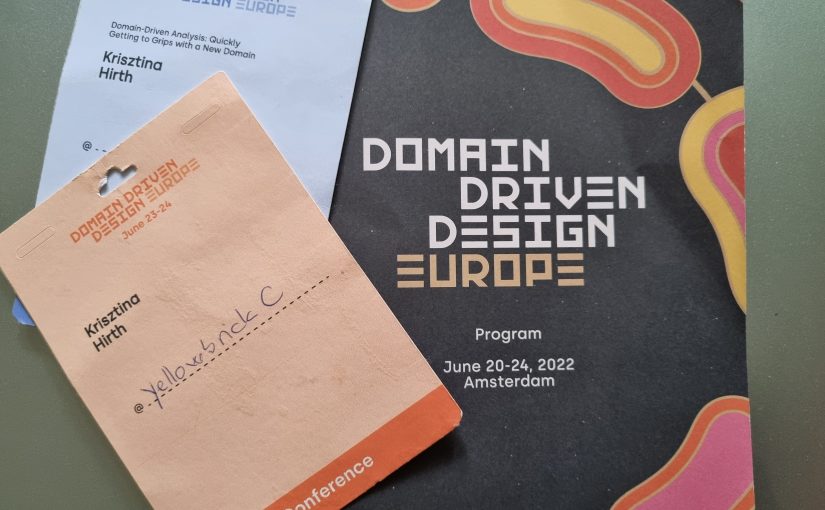This is the list of the sessions I watched, some with additional insights, others as a resource. All of them are recommended if the topic is interesting to you.
All sessions recorded during the conference can be viewed on the KanDDDinsky YouTube channel.
Keynote By Mathias Verraes about Design & Reality
Thought-provoking, like all talks I saw from Mathias.
Connascence: beyond Coupling and Cohesion (Marco Consolaro)
An interesting old concept regarding cohesion and good developer practices. Fun fact: I had never heard of Connascence before, but two times at this conference 😀.
Learn more about this from Jim Weirich’s “Grand Unified Theory of Software Design” (YouTube). It is a clear recommendation for programmers wanting to learn how to reduce cohesion.
Architect(ure) as Enabler of Organization’s Flow of Change (Eduardo da Silva)

“The level and speed of innovation has exploded, but we still have old mental models when it comes to organisations” – Taylorism says hello 🙁

“There is no absolute wrong or right in the organisational model of the architecture owners; it is contextual and depends on the maturity.”
This talk is highly recommended if you work in or with big organisations.
Systems Thinking by combining Team Topologies with Context Maps (Michael Plöd)

💯 recommended! (The slides are on speakerdeck.)
Road-movie architectures – simplifying our IT landscapes (Uwe Friedrichsen)

“The architecture is designed for 80-20% of the teams, and it is ignored by 80-20% of them.”

Uwe describes his concept-in-evolution of a desirable solution that could help avoid the different traps. They should be
- collaborative and inclusive,
- allowing to travel light with the architecture,
- topical and flexible
The concept is fascinating, with a lot of good heuristics. A clear recommendation 👍
How to relate your OKRs to your technical real-estate (Marijn Huizenveld)


The slides are on speakerdeck. Marijn is a great speaker; the talk is recommended if you work with OKRs.
Improving Your Model by Understanding the Persona Behind the User (Zsofia Herendi)

😱 what about the rest of 24%?!! Do they not even expect to get what they need?
Zsofia gives a lot of good tips about visualising and understanding the personas.
Balancing Coupling in Software Design (Vladik Khononov)
Maths meet physics meet software development – yet again, a talk from Vladik, which must be seen more than once.

By reducing one of these elements (strength, volatility, distance) to 0, the maintenance pain due to coupling can be reduced to (almost) 0. Now we know what we have to do 😁.
Culture – The Ultimate Context (Avraham Poupko)
Why does not have the DDD community any actual conflicts? Because our underlying concept is to collaborate – to discuss, challenge, decide, agree, commit (even if we disagree) and act.
This talk is so “beautiful” (I know, it is a curious thing to say), so overwhelming (because of this extraordinary speaker 💚), it would be a failure even to try to describe it! It is available, go and watch it if you want to understand the DDD community.
This list is just a list. It won’t give you any hints about the hallway conversations which happen everywhere, about the feeling of “coming home to meet friends!” which I got each year, and I won’t even try 🙂.

